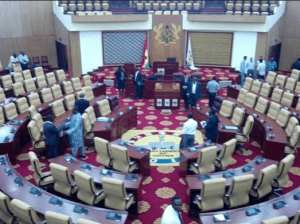Civil Society pleads with Parliament to pass Right to Information bill
 The Civil Society Platform on the International Monetary Fund (IMF) Bailout, a pressure group on Tuesday, pleaded with Parliament to hasten the passage of the Right to Information (RTI) Bill into Law before going for recess in March, 2015.
The Civil Society Platform on the International Monetary Fund (IMF) Bailout, a pressure group on Tuesday, pleaded with Parliament to hasten the passage of the Right to Information (RTI) Bill into Law before going for recess in March, 2015.
They argued that the RTI Bill, when passed into law, would among other things, provide a hierarchy of administrative avenues to ensure citizens get access to information and make the resort to the law courts a last option.
The Platform, therefore, urged Parliamentarians to put the interest of the nation first and not betray the trust of their constituents by showing a lot more commitment to have the second reading and subsequently pass the RTI Bill into Law so that the country would not just have a law, but a legislation that opens the door for people to have real access to information.
They also called on government to be open and engaging in the implementation of the eventual programme with the IMF, and not to let down the citizens by failing to grant them the critical tool for assessing the use of public resources, which was the Law on RTI, for them to effectively monitor the implementation of the bailout as was the case in the past.
The Bill, which has over the years been worked on by the Attorney-General’s Department, Parliament’s Select Committee on Constitutional, Legal and Parliamentary Affairs and the Coalition on the Right to Information, among others, was currently awaiting its second reading and possible passage before Parliament goes on recess this month.
Mr Joseph Winful, the Chairman of the Civil Society Platform on the IMF Bailout, at a press conference in Accra, said given the level of progress that has been made on the bill, it was expected that the Bill would have been passed by now.
“Yet, as at today, the Bill is yet to be tabled for second reading to enable the commencement of discussions and debate on the Bill on the floor of Parliament”, he said.
According to him, the current state of affairs should be of grave concern to all Ghanaians and civil society cannot fathom why there were still delays in having the second reading of the bill although Parliament’s Select Committee on Constitutional, Legal and Parliamentary Affairs has concluded its deliberations and submitted its report to the House.
The RTI Bill, when passed into Law, would facilitate among other things, the citizen’s access to information on how public funds were disbursed and what government plans to do in their name and on their behalf, and hold public office holders accountable for the management of public resources and ensure judicious use of public funds.
Mr Winful said the call by the Civil Society Platform aligns with President John Dramani Mahama’s commitment to ensure that “as a country we do not again in our history revert to the IMF in the near future for another Fund programme for whatever reasons”, and that, we should be able to do things right and learn from past errors.
The Platform, he said, affirms that, the need for a RTI Law has now become even more imperative with the signing of the eventual IMF bailout programme, which is expected next month to kick start implementation.
Currently, it is very difficult for academia, think-thanks, civil society as well as the media to access basic public information as enshrined in the 1992 Constitution, as most public officials and state institutions determines when or what time to provide such information, or at times some totally decline such requests.
The platform was convinced that citizen-based monitoring and evaluation of public policies and programmes as well as provision of feedback and suggestions under the IMF programme, were sure ways to assess the government’s execution of social and economic programmes so as to check wastefulness in the system and protect the public purse.
Source: GNA
